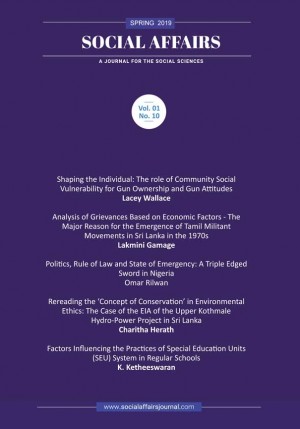The MigraTion-inTersTaTe ConfliCT nexus
Journal title: Social Affairs
Authors: Sabastiano Rwengabo
Subject(s): Economics, Law, Social Sciences, History , International Relations, Political Science, Sociology

Journal title: Social Affairs
Authors: Sabastiano Rwengabo
Subject(s): Economics, Law, Social Sciences, History , International Relations, Political Science, Sociology
Journal title: Social Affairs
Authors: M. M. C. De Silva
Subject(s): Economics, Law, Social Sciences, History , International Relations, Political Science, Sociology
Journal title: Social Affairs
Authors: Siri Gamage
Subject(s): Economics, Law, Social Sciences, History , International Relations, Political Science, Sociology
Journal title: Social Affairs
Authors: Mahinda Deegalle
Subject(s): Economics, Law, Social Sciences, History , International Relations, Political Science, Sociology
Journal title: Social Affairs
Authors: Apsara Karunaratne
Subject(s): Economics, Law, Social Sciences, History , International Relations, Political Science, Sociology
Journal title: Social Affairs
Authors: Sarathchandra Gamlath
Subject(s): Economics, Law, Social Sciences, History , International Relations, Political Science, Sociology
Journal title: Social Affairs
Authors: Chamika Dahanayake
Subject(s): Economics, Law, Social Sciences, History , International Relations, Political Science, Sociology
Journal title: Social Affairs
Authors: Rathnayake M. Abeyrathne
Subject(s): Economics, Law, Social Sciences, History , International Relations, Political Science, Sociology
Journal title: Social Affairs
Authors: Sumana Rathnayake
Subject(s): Economics, Law, Social Sciences, History , International Relations, Political Science, Sociology
Journal title: Social Affairs
Authors: Nadeeka Amarasinghe
Subject(s): Economics, Law, Social Sciences, History , International Relations, Political Science, Sociology
Journal title: Social Affairs
Authors: Mahesh Chougule
Subject(s): Economics, Law, Social Sciences, History , International Relations, Political Science, Sociology
Journal title: Social Affairs
Authors: Sarathchandra Gamlath and Shamini Attanayaka
Subject(s): Economics, Law, Social Sciences, History , International Relations, Political Science, Sociology
Journal title: Social Affairs
Authors: Gamini Samaranayake
Subject(s): Economics, Law, Social Sciences, History , International Relations, Political Science, Sociology
Journal title: Social Affairs
Authors: Darshi Thoradeniya
Subject(s): Economics, Law, Social Sciences, History , International Relations, Political Science, Sociology
Journal title: Social Affairs
Authors: Asitha G Punchihewa
Subject(s): Economics, Law, Social Sciences, History , International Relations, Political Science, Sociology